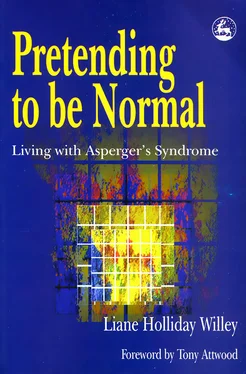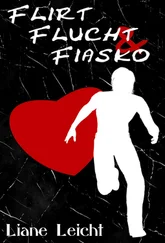Liane Holliday Willey - Pretending to be Normal
Здесь есть возможность читать онлайн «Liane Holliday Willey - Pretending to be Normal» весь текст электронной книги совершенно бесплатно (целиком полную версию без сокращений). В некоторых случаях можно слушать аудио, скачать через торрент в формате fb2 и присутствует краткое содержание. Город: London, Год выпуска: 2000, ISBN: 2000, Издательство: Jessika Kingsley Publishers, Жанр: Психология, Биографии и Мемуары, на английском языке. Описание произведения, (предисловие) а так же отзывы посетителей доступны на портале библиотеки ЛибКат.
- Название:Pretending to be Normal
- Автор:
- Издательство:Jessika Kingsley Publishers
- Жанр:
- Год:2000
- Город:London
- ISBN:1 85302 577 1
- Рейтинг книги:4 / 5. Голосов: 1
-
Избранное:Добавить в избранное
- Отзывы:
-
Ваша оценка:
- 80
- 1
- 2
- 3
- 4
- 5
Pretending to be Normal: краткое содержание, описание и аннотация
Предлагаем к чтению аннотацию, описание, краткое содержание или предисловие (зависит от того, что написал сам автор книги «Pretending to be Normal»). Если вы не нашли необходимую информацию о книге — напишите в комментариях, мы постараемся отыскать её.
Pretending to be Normal — читать онлайн бесплатно полную книгу (весь текст) целиком
Ниже представлен текст книги, разбитый по страницам. Система сохранения места последней прочитанной страницы, позволяет с удобством читать онлайн бесплатно книгу «Pretending to be Normal», без необходимости каждый раз заново искать на чём Вы остановились. Поставьте закладку, и сможете в любой момент перейти на страницу, на которой закончили чтение.
Интервал:
Закладка:
I never experienced apprehension or fear when I spoke in public. I do not understand why so many people do. I wonder if I am missing something, if I am overlooking some obvious problem with public speaking that falls beyond my grasp. Maybe I enjoy speaking in front of a group because it is a one-way communication experience and, as such, something that is not affected by the complications of other people’s body language and non-verbal styles. Given a chance, I would much rather speak to a large group than I would to an individual or two. Small group conversations make my nerves feel like they are wearing stilts on an icy pavement. When I talk to other people, I have trouble following conversation transitions. I step on other people’s words, stumbling ahead with my own thoughts, in almost every conversation I have. It was not like this when I performed monologues and oratories. It was easier. I never stumbled a bit. Standing on stage was a release for me, even though I was always a solo performer and so, on my own each and every time. It was as if all the thoughts I kept trapped throughout the day, all my weird observations on life and my strange obsessive wonderings, could leave my conscious and find a new home within someone else’s mind. Once my thoughts were spoken aloud, I could finally move on to another thought or concern.
Speech competitions taught me a great deal about myself, especially when I was off the stage. On stage, I could try on the entire range of human emotions, even the emotions I typically had nothing to do with, and then as easily as I slipped them on, I could take them off and re-shelf them until the next time. But offstage, I did not have the luxury of pretending. I remember the first time I knew there was a vast difference between what I was able to make myself do in front of an audience, and what I could coax from myself when I was left without the stage lights. When I had to be me around peers I had not known for a long time, especially peers I was meeting for the first time, I froze.
Hindsight tells me this was AS nagging my reality, bubbling up and over until it became a cold, wet hand that held my calm to an ice tray white with frost. Try as I might, I could not sneak back and forth between the world of the normal and the world of the irregular. I seemed to shout my arrival the moment I made it to one place or the other. When I visited normal, I was relatively sure of myself and largely able to maintain my sense of composure, despite the fact I worried all along that eventually someone would discover I was an outsider. But when I side-stepped my way to the irregular, the glue that held me together softened and I melted a bit. Suddenly, without any kind of warning, my nerves would jump to center stage and demand my attention, making it impossible for me to remember any of the interpersonal speaking techniques and body language expressions I could show on stage. Something odd would happen to me and I would retreat into the places I used to visit when I was a little girl. I would turn my mind from everything that was going on around me, even the laughter and the jokes, the friendly discussions about everyone’s upcoming events and the well wishes that were coming my way. I would concentrate instead on blanking out my thoughts, counting over and over and wishing I was in a still spot away from the noise. Maybe I was experiencing sensory overload. Maybe I was frazzled because I did not have any way of predicting what would come next. Or, maybe I simply felt uncomfortable sharing close space with people so foreign to me. All I know for certain is that these moments were terrible. Faces began to merge together, voices sounded out of sync and my perception fooled me. Things ran on slow speed then, letting an eternity slip by until I could find a quiet corner or an empty room to gather myself up again. It was hard to make me right at that point, but given time, I always did.
It is tempting for me to reexamine that period according to the knowledge I now have, and each time I do, I find myself wondering if I might not have learned more if I had not isolated myself from my peers. Would I have learned more useful information about personal interactions if I had been a part of a drama team instead of a solo act? Would I have come to realize that emotions and expressions and words are empty if they are not shared and received? Would I have been able to see, years before I finally did, that communication does not rest against a flat surface, but that it has a vivid, virtually three-dimensional element to it? I can only wonder…
The study of all things linguistic was clearly one of my favorite obsessions, but it paled in comparison to the fixation I kept on the wild western frontier and Hollywood’s romantic comedies. When I was not watching the movies on television, looking through my vast collection of movie magazines or one of the dozens of books I had on the history of film, I was usually turning the pages of every fiction and nonfiction book I could find on cowboys and train robbers and American Indians and pioneers and western settlers. I loved anything to do with the way America lived in the late 1800s. I rode my horse bareback because that was how native Americans rode. I bought a cowboy hat with my first babysitting money. I even inquired into my genealogy to see if I was related to the infamous gambler and gun fighter, Doc Holliday. Other girls in their teens did not seem to share my interest in the old west, but then, neither did the boys. Not that any of them seemed particularly put off when I went on and on about how fascinating those times were. They were politely tolerant, but not inclined to add much to the conversation. After a while, I stopped trying to talk to my friends about my favorite topics, but I never stopped thinking about them or enjoying them on my own. I went to see western movies and old films by myself, not giving one moment’s thought to the notion that this was an uncool thing to do. I made audiotapes of western television series and played them over and over instead of listening to the radio. I wandered the archives of the library all alone, never dreaming of asking someone else to join me in searching the stacks for books about Annie Oakley or Wild Bill Hickock or Sitting Bull. And I argued with my teachers when they tried to convince me to read something other than western lore, telling them it was my goal to read every book in the library on every western character I could find. I think I did.
I mark my growing obsessions in my own interests as the point when I should have begun to lose my footing in the friendship circles I called my own. I am amazed my peers put up with me and my peculiarities. Truth be known, they may not have, had it not been for a very good friend of mine named Craig. This friend was very bright and very funny and very well-liked. With him by my side, I was given an instant elevated status among our group and even beyond. He had been my friend almost forever and over the years he had become almost like a guardian to me. I do not know if he knew the struggles I faced when I tried to accomplish social skills without the benefit of some kind of direct instruction, and I do not know if he understood there were knots in my belly when I was around new people or faced with new situations, but I do know that he was somehow always there for me whenever I found myself swimming upstream or feeling penned in. In subtle and overt ways, he would show his support for me by saving me a seat at lunch, walking me to class, or picking me up to take me to a party. He fixed me up on dates, made me laugh when my nerves started to twitch, and kept me company if I was all alone in a crowd. He even came with me on a family vacation once when the person I had invited to come along had to cancel. Craig jumped in to my rescue even before I knew I needed to be rescued.
Читать дальшеИнтервал:
Закладка:
Похожие книги на «Pretending to be Normal»
Представляем Вашему вниманию похожие книги на «Pretending to be Normal» списком для выбора. Мы отобрали схожую по названию и смыслу литературу в надежде предоставить читателям больше вариантов отыскать новые, интересные, ещё непрочитанные произведения.
Обсуждение, отзывы о книге «Pretending to be Normal» и просто собственные мнения читателей. Оставьте ваши комментарии, напишите, что Вы думаете о произведении, его смысле или главных героях. Укажите что конкретно понравилось, а что нет, и почему Вы так считаете.












